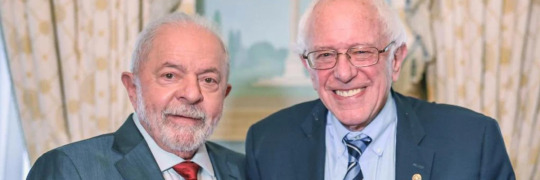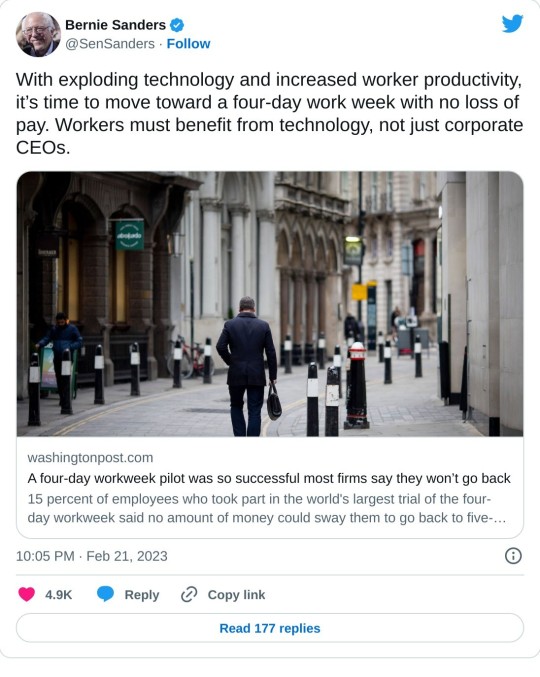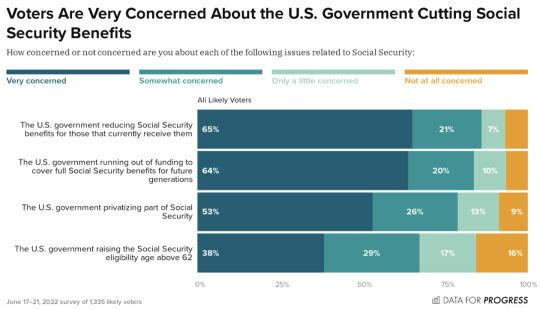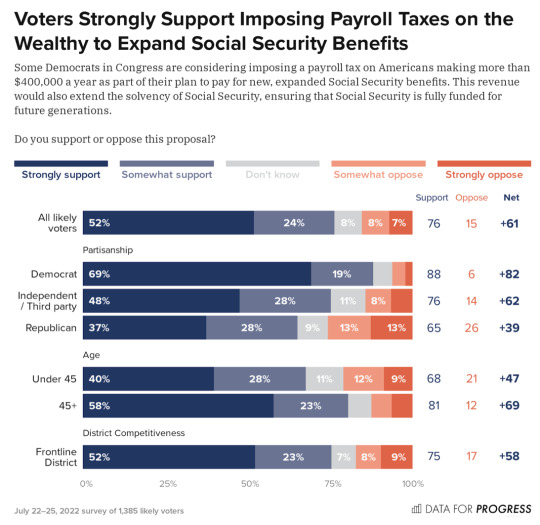#bernie sanders chair
Text
[After Tankhun finds out about Kim breaking Chay’s heart]
Announcer: We are LIVE here at Wik’s concert and- wait, what’s this? It’s, it’s, BY GOD IT’S KHUN TANKHUN WITH A STEEL TRAY!
#kinnporsche the series#kimchay#this is taken from that Bernie sanders steel chair tweet lol#I want Tankhun to take Chay under his wing and freak when he hears about Kim playing with Chay’s feelings#and proceed to give Kim the smackdown of a lifetime#I like Kim and love Jeff Satur but oh boy I want to his character suffer a bit#shitpost#.txt
88 notes
·
View notes
Text
“Too old to be president.” Here we go again. By Ashton Applewhite at This Chair Rocks.
1 note
·
View note
Text
Things Biden and the Democrats did, this week #10
March 15-22 2024
The EPA announced new emission standards with the goal of having more than half of new cars and light trucks sold in the US be low/zero emission by 2032. One of the most significant climate regulations in the nation’s history, it'll eliminate 7 billion tons of CO2 emissions over the next 30 years. It's part of President Biden's goal to cut greenhouse gas emissions in half by 2030 on the road to eliminating them totally by 2050.
President Biden canceled nearly 6 Billion dollars in student loan debt. 78,000 borrowers who work in public sector jobs, teachers, nurses, social workers, firefighters etc will have their debt totally forgiven. An additional 380,000 public service workers will be informed that they qualify to have their loans forgiven over the next 2 years. The Biden Administration has now forgiven $143.6 Billion in student loan debt for 4 million Americans since the Supreme Court struck down the original student loan forgiveness plan last year.
Under Pressure from the administration and Democrats in Congress Drugmaker AstraZeneca caps the price of its inhalers at $35. AstraZeneca joins rival Boehringer Ingelheim in capping the price of inhalers at $35, the price the Biden Admin capped the price of insulin for seniors. The move comes as the Federal Trade Commission challenges AstraZeneca’s patents, and Senator Bernie Sanders in his role as Democratic chair of the Senate Health Committee investigates drug pricing.
The Department of Justice sued Apple for being an illegal monopoly in smartphones. The DoJ is joined by 16 state attorneys general. The DoJ accuses Apple of illegally stifling competition with how its apps work and seeking to undermining technologies that compete with its own apps.
The EPA passed a rule banning the final type of asbestos still used in the United States. The banning of chrysotile asbestos (known as white asbestos) marks the first time since 1989 the EPA taken action on asbestos, when it passed a partial ban. 40,000 deaths a year in the US are linked to asbestos
President Biden announced $8.5 billion to help build advanced computer chips in America. Currently America only manufactures 10% of the world's chips and none of the most advanced next generation of chips. The deal with Intel will open 4 factories across 4 states (Arizona, Ohio, New Mexico, and Oregon) and create 30,000 new jobs. The Administration hopes that by 2030 America will make 20% of the world's leading-edge chips.
President Biden signed an Executive Order prioritizing research into women's health. The order will direct $200 million into women's health across the government including comprehensive studies of menopause health by the Department of Defense and new outreach by the Indian Health Service to better meet the needs of American Indian and Alaska Native Women. This comes on top of $100 million secured by First Lady Jill Biden from ARPA-H.
Democratic Senators Bob Casey, Tammy Baldwin, Sherrod Brown, and Jacky Rosen (all up for re-election) along with Elizabeth Warren, Cory Booker, and Sheldon Whitehouse, introduced the "Shrinkflation Prevention Act" The Bill seeks to stop the practice of companies charging the same amount for products that have been subtly shrunk so consumers pay more for less.
The Department of Transportation will invest $45 million in projects that improve Bicyclist and Pedestrian Connectivity and Safety
The EPA will spend $77 Million to put 180 electric school buses onto the streets of New York City This is part of New York's goal to transition its whole school bus fleet to electric by 2035.
The Senate confirmed President Biden's nomination of Nicole Berner to the Court of Appeals for the Fourth Circuit. Berner has served as the general counsel for America's largest union, SEIU, since 2017 and worked in their legal department since 2006. On behalf of SEIU she's worked on cases supporting the Affordable Care Act, DACA, and against the Defense of Marriage act and was part of the Fight for 15. Before working at SEIU she was a staff attorney at Planned Parenthood. Berner's name was listed by the liberal group Demand Justice as someone they'd like to see on the Supreme Court. Berner becomes one of just 5 LGBT federal appeals court judges, 3 appointed by Biden. The Senate also confirmed Edward Kiel and Eumi Lee to be district judges in New Jersey and Northern California respectively, bring the number of federal judges appointed by Biden to 188.
#Thanks Biden#Joe Biden#Democrats#politics#US politics#climate change#climate crisis#student loans#debt forgiveness#shrinkflation#women's health#drug prices
445 notes
·
View notes
Text
On Wednesday, Senate Health, Education, Labor and Pensions (HELP) Chair Bernie Sanders (I-Vermont) and Rep. Pramila Jayapal (D-Washington) reintroduced a proposal to make higher education free at public schools for most Americans — and pay for it by taxing Wall Street.
The College for All Act of 2023 would massively change the higher education landscape in the U.S., taking a step toward Sanders’s long-standing goal of making public college free for all. It would make community college and public vocational schools tuition-free for all students, while making any public college and university free for students from single-parent households making less than $125,000 or couples making less than $250,000 — or, the vast majority of families in the U.S.
The bill would increase federal funding to make tuition free for most students at universities that serve non-white groups, such as Historically Black Colleges and Universities (HBCUs). It would also double the maximum award to Pell Grant recipients at public or nonprofit private colleges from $7,395 to $14,790.
If passed, the lawmakers say their bill would be the biggest expansion of access to higher education since 1965, when President Lyndon B. Johnson signed the Higher Education Act, a bill that would massively increase access to college in the ensuing decades. The proposal would not only increase college access, but also help to tackle the student debt crisis.
“Today, this country tells young people to get the best education they can, and then saddles them for decades with crushing student loan debt. To my mind, that does not make any sense whatsoever,” Sanders said. “In the 21st century, a free public education system that goes from kindergarten through high school is no longer good enough. The time is long overdue to make public colleges and universities tuition-free and debt-free for working families.”
Debt activists expressed support for the bill. “This is the only real solution to the student debt crisis: eliminate tuition and debt by fully funding public colleges and universities,” the Debt Collective wrote on Wednesday. “It’s time for your member of Congress to put up or shut up. Solve the root cause and eliminate tuition and debt.”
These initiatives would be paid for by several new taxes on Wall Street, found in a separate bill reintroduced by Sanders and Rep. Barbara Lee (D-California) on Wednesday. The Tax on Wall Street Speculation would enact a 0.5% tax on stock trades, a 0.1% tax on bonds and a 0.005% tax on trades on derivatives and other types of assets.
The tax would primarily affect the most frequent, and often the wealthiest, traders and would be less than a typical fee for pension management for working class investors, the lawmakers say. It would raise up to $220 billion in the first year of enactment, and over $2.4 trillion over a decade. The proposal has the support of dozens of progressive organizations as well as a large swath of economists.
“Let us never forget: Back in 2008, middle class taxpayers bailed out Wall Street speculators whose greed, recklessness and illegal behavior caused millions of Americans to lose their jobs, homes, life savings, and ability to send their kids to college,” said Sanders. “Now that giant financial institutions are back to making record-breaking profits while millions of Americans struggle to pay rent and feed their families, it is Wall Street’s turn to rebuild the middle class by paying a modest financial transactions tax.”
#us politics#news#truthout#sen. bernie sanders#progressives#progressivism#Democrats#senate health education labor and pensions committee#College for All Act of 2023#tax Wall Street#tax the rich#tax the 1%#tax the wealthy#college for all#student debt#student loan debt#tuition-free college#Historically Black Colleges and Universities#pell grants#Higher Education Act#Rep. Barbara Lee#rep. pramila jayapal#2023
466 notes
·
View notes
Text
Chaos appears to have begun on the floor during the speaker of house vote and-- OH MY GOD

IT'S SENATOR BERNIE SANDERS WITH A STEEL CHAIR
677 notes
·
View notes
Text
lol the chair of the German SPD canceled a meeting w Bernie Sanders bc his statement on Gaza wasn’t racist enough towards Palestinians
36 notes
·
View notes
Text
Sen. John Fetterman could land himself in trouble with voters after he doubled down on his claims that he is not a progressive Democrat, despite comments he made during his election campaign.
"I'm not a progressive, I'm just a regular Democrat," Fetterman said on X, formerly Twitter.
The statement was contradicted by the website's community notes feature, referencing tweets from Fetterman in 2016 and 2020 in which he clearly said he was a progressive.
Despite the contradiction, Fetterman has noticeably shifted away from the position upon which he narrowly defeated Donald Trump-endorsed Dr. Mehmet Oz in the 2022 midterms.
Politicians such as Vermont Sen. Bernie Sanders, an independent closely aligned with the left of the Democratic Party, have called for a ceasefire in Gaza, whereas Fetterman has said he supports the Israeli response to the attack by the Palestinian militant group Hamas on October 7 "unequivocally," despite criticism that it has been too strong.
"I just think I'm a Democrat that is very committed to choice and other things. But with Israel, I'm going to be on the right side of that," Fetterman said.
The Pennsylvania senator's stance on Israel is a particular source of ire for many who consider themselves part of the progressive movement, largely younger voters.
A November 2021 poll by Pew Research recorded that 71 percent of the progressive left movement is made up of people aged 18 to 49.
It is young voters that favored Fetterman in his 2022 Senate race against Oz. According to an exit poll taken by Statista, 72 percent of voters aged 18-24 who answered said they voted for the Democrat. The figure was similar for voters aged 25 to 29, at 68 percent.
His position on Israel-Gaza could spell trouble among this voter demographic. According to a New York Times/Siena poll published on Tuesday, 45 percent of people aged 18 to 29 think President Joe Biden is "too supportive" of Israel. In the same age group, 46 percent of people who responded said they were supportive of Palestine, compared to 27 percent favoring Israel.
The same poll said that just 20 percent of all voters aged 18 to 29 believe Biden is handling the conflict well. Asked about the result on CNN on Tuesday, Fetterman said: "If you're getting your perspective on the world on TikTok, it's going to tend to be kinda warped."
He added: "Sometimes you may alienate some voters, but it is really most important to be on the right side on that. That's where I am at."
A total of 16 of his former campaign staffers wrote him an open letter, asking him to change his stance.
"It is not too late to change your stance and stand on the righteous side of history," it said.
An op-ed in news outlet PennLive was published in November by Mireille Rebeiz, Ph.D., chair of Middle East Studies and associate professor at Dickinson College in Carlisle, Pennsylvania, in which his position on the issue was labeled "disturbing" and saying he was "unworthy of my trust."
Fetterman has called for humanitarian aid to be sent to Gaza, but criticized pro-Palestinian protesters when they staged a demonstration outside a Jewish-owned store in Philadelphia in December, calling the gathering antisemitic.
Immigration is also a divisive issue in Congress, and Fetterman has made it clear he wants to work with Senate Republicans and says it is a "reasonable conversation" to have. The GOP has pushed for stricter measures along the southern border with Mexico.
"It's a reasonable conversation—until somebody can say there's an explanation on what we can do when 270,000 people are being encountered on the border, not including the ones, of course, that we don't know about," Fetterman said to NBC. "To put that in reference, that is essentially the size of Pittsburgh, the second-largest city in Pennsylvania."
His wife, Gisele Fetterman, arrived undocumented from Brazil as a 7-year-old and was an important part of his Senate campaign. Some accused him of throwing his wife under the bus because of his stance.
Newsweek has reached out to Fetterman via email through his Senate office for comment.
"Fetterman has never been progressive, but endorsing talks for tougher immigration laws when he's married to an incredible woman who was once an illegal immigrant and who kept his campaign alive while he was recovering from a stroke is actually sickening," said Alexandra Hunt, a former Democrat candidate for Pennsylvania's 3rd Congressional District.
The conversation around Fetterman has some such as left-leaning commentator Mehdi Hasan questioning if he is the "new Kyrsten Sinema," the Arizona senator who became an independent in 2022.
"Fetterman has been a pleasant surprise for his Republican colleagues and a thorn in the side of progressive Democrat," Hasan wrote in British news magazine The Spectator in December. He added: "One still has to wonder if he might follow in Sinema's footsteps and officially extricate himself from the two-party system."
Sinema cited a "deeply broken two-party system" as the reason she left the Democratic Party in 2022.
However, Heath Mayo, a conservative who founded the anti-Trump nonprofit Principles First, praised Fetterman.
"John Fetterman is testing a lot of new boundaries for the Democratic Party right now. Aggressively pro-Israel, pro-border security, anti-corruption in his own party[...]That's principled leadership and Dems should embrace it. He is speaking to a lot of us," Mayo said.
On X, Hasan said Fetterman's comments on him not being aligned with the progressive movement was "a total attack on the people who worked hard to elect him."
23 notes
·
View notes
Text
🤦🏾🤦🏽🤦🏼
Netanyahu has a whopping 18% approval rating in Israel. Trump’s going to be a 1000 times worse than Biden concerning Muslims, and CNN along with Tlaib are trying to turn people against Biden.
Right-wing Netanyahu needs to go and Hamas need to go. Hamas are murderous terrorists doing the bidding of Iran and Putin. Trump is already calling for Palestinians to be deported but all these people who are supposedly on the left don’t even mention it but are dragging Biden. Let’s revisit this if Trump wins and see if Tlaib accepts any responsibility for a potential Biden loss and the harm it would bring to Muslim-Americans and Muslims abroad. I wouldn’t be surprised if one of the reasons the Republikkkans refused to censure Tlaib is because they so successfully use her as a foil in their bullshit culture war. Fascism works best when you have a foil/scapegoat to generate anger and hatred.
Being cynical here but they love the extreme far-left for making their propaganda campaigns so easy. Those right-wing bastards win so often because they are always in lockstep and on the same page. They use billions in dark money from oligarchs to run a well oiled propaganda machine 24/7/365. They are incredibly cohesive, unified, and prepared. They are doing opposition research on college students that may run for office as Democrats decades into the future while Democrats have always been every person for themselves. It wasn’t until after Kerry lost to “Dubya” Bush (due in large part to RNC brain bug Karl Rove) that DNC chair Howard Dean took the first steps towards organizing the party. He introduced media relations seminars for newly elected Dems, warned them against going on Fox News, and began disseminating information about the “vast right-wing conspiracy” of oligarch created RNC PACs, think tanks, and institutions like ALEC, the Federalist Society, the CATO Institute, the Mackinac Center.
25 notes
·
View notes
Text

The Queen died on Bernie Sanders's birthday, beautiful, I love it. Happy Birthday, Bern.
All I can think of is "Looks like the queen is starting to recover... Oh, what's this? IT'S BERNIE SANDERS WITH A STEEL CHAIR!"

295 notes
·
View notes
Text
Things Biden and the Democrats did, this week #12
March 29-April 5 2024
President Biden united with Senator Bernie Sanders at the White House to review Democratic efforts to bring down drug prices. President Biden touted his Administration’s capping the price of insulin for seniors at $35 a month and capping the price of prescription drugs for seniors at $2,000 a year. Biden hopes to expand both to all Americans through legislation next year with a Democratic congress. The President also praised Senator Sanders' efforts as chair of the Senate Health Committee which has lead to major drug manufacturers capping the price of inhalers at $35 a month. “Bernie, you and I have been fighting this for 25 years,” Biden said “Finally, finally we beat Big Pharma. Finally.”
The White House gave an update on its actions around the Francis Scott Key Bridge disaster. The federal government working with state and local governments hope to have enough of the remains of the bridge cleared to partially reopen the Port of Baltimore by the end of the month and have the port working normally by May. The Administration has already released $60 million in emergency money toward rebuilding and promises the federal government will cover the cost. The Department of Labor has released $3.5 million for Dislocated Worker Grants and plans up to $25 million to cover lost wages. The Small Business Administration is offering $2 million in emergency loans to affected small businesses. The Administration is working with business and labor unions to keep workers at work and cover lost wages.
Vice-President Harris and EPA Administrator Michael Regan announced $20 billion to help finance tens of thousands of climate and clean energy projects across the country. The kinds of projects that will be financed through this project include distributed clean power generation and storage, net-zero retrofits of homes and small businesses, and zero-emission transportation. 70% of the funds, $14 billion, will be invested in low-income and disadvantaged communities. The project is part of a public private partnership so for every 1 dollar of federal money, private companies have promised 7 dollars of investment, bring the total to $150 billion for ongoing financing of climate and clean energy projects for years to come.
The Department of Transportation announced $20.5 billion in investments in public transportation. This represents the largest single investment in public transit by the federal government in history. The money will go to improving and expanding subways, light rail, buses, and ferry systems across America. The DoT hopes to use the funds to in particular expand and improve options for public transport for people with disabilities and seniors.
The Departments of Energy and The Treasury announced $4 billion in tax credits for businesses investing in clean energy, critical materials recycling, and Industrial decarbonization. The credits till go toward 100 projects across 35 states. 67% of the credits ($2.7 billion) will go to clean energy, wind, solar, nuclear, clean hydrogen, as well as updates to grids, better batter storage, and investments in electric vehicles. 20% ($800 million) will go to to recycling things like lithium-ion batteries, and 13% ($500 million) to decarbonization in industries like automotive manufacturing, and iron and steel.
The Department of Agriculture announced $1.5 Billion in investments in climate-smart agriculture. USDA plans to support over 180,000 farms representing 225 million acres in the next 5 years move toward more climate friendly agriculture. 40% of the project is reserved for disadvantaged communities, in line with the Biden Administrations standard for climate investment. $100 million has been reserved for projects in Tribal Communities.
The Department of the Interior approved the New England Wind offshore wind project. To be located off Martha’s Vineyard the New England project represents the 8th such off shore wind project approved by the Biden administration. Taken together these projects will generate 10 gigawatts of totally clean energy that can power 4 million homes. The Administration's climate goals call for 30 gigawatts of off shore wind power by 2030. The New England Wind project itself is expected to generate 2,600 megawatts of electricity, enough to power more than 900,000 homes in the New England area.
The Department of the Interior announced $320 Million for tribal water infrastructure. Interior also announced $244 million to deal with legacy pollution from mining in the State of Pennsylvania, as well as $25 million to protect wetlands in Arizona and $19 million to put solar panels over irrigation canals in California, Oregon and Utah. While the Department of Energy announced $27 million for 40 projects by state, local and tribal governments to combat climate change
#Thanks Biden#Joe Biden#Bernie Sanders#political#american politics#Democrats#health care#climate change#drug prices#clean energy
140 notes
·
View notes
Text
Bernie Sanders, US Progressives Meet Lula Ahead of Brazilian President's First White House Visit
The Congressional Progressive Caucus, of which Sanders is a member, said Brazilian President Luiz Inácio Lula da Silva's election "has given hope to democratic and progressive movements around the world."

Ahead of his first White House meeting with U.S. President Joe Biden, Brazilian President Luiz Inácio Lula da Silva met Friday with members of the Congressional Progressive Caucus, including Sen. Bernie Sanders, who said topics of discussion included the far-right threat, combatting the climate and environmental emergencies, and supporting workers.
"I enjoyed a productive meeting this morning with President Lula of Brazil and his cabinet," Sanders said in a statement. "Our countries share many challenges, including the threat of right-wing authoritarians who seek to undermine democratic institutions in both countries."
"I am very impressed that in his short visit to the United States, Lula chose to speak to the AFL-CIO," he added. "In that regard, we discussed ways to build an economy that serves all people, not just the wealthy and large corporations. We also discussed ways to advance workers' rights and build strong unions."
Three other members of the Congressional Progressive Caucus—Chair Pramila Jayapal (D-Wash.) and Reps. Ro Khanna (D-Calif.) and Alexandria Ocasio-Cortez (D-N.Y.)—also met with da Silva.
Continue reading.
#brazil#politics#united states#us politics#brazilian politics#luiz inacio lula da silva#bernie sanders#alexandria ocasio cortez#ro khanna#pramila jayapal#foreign policy#international politics#mod nise da silveira#image description in alt
47 notes
·
View notes
Text
Bernie Sanders thinks you should work fewer days.
The progressive from Vermont chimed in on the four-day work week debate on Twitter, writing: "With exploding technology and increased worker productivity, it's time to move toward a four-day work week with no loss of pay. Workers must benefit from technology, not just corporate CEOs."

Sanders was referencing the latest findings out of the UK on the four-day work week. A large-scale pilot program, spanning over 3,000 workers, found that workers slept better, firms made more money, and employees were less likely to say they did not have enough time to care for loved ones.
As the Washington Post reports, most of the companies involved in the pilot plan on continuing to use a four-day work week.
The concept of a four-day work week has increasingly caught on over the last few years, with firms and researchers alike taking the plunge to cut back hours without reducing pay.
As Insider reported in December, 4 Day Week Global — a New Zealand-based nonprofit — conducted a study involving 33 participating companies that employed 969 people based in the US, Australia, Ireland, the United Kingdom, New Zealand, who adopted a four-day work week in a pilot program over a six-month period, and it found it was a "resounding success on virtually every dimension."
"Companies are extremely pleased with their performance, productivity and overall experience, with almost all of them already committing or planning to continue with the 4 day week schedule," the report said.
"Revenue has risen over the course of the trial. Sick days and absenteeism are down," it continued. "Companies are hiring. Resignations fell slightly, a striking finding during the 'Great Resignation.' Employees are similarly enthusiastic. And climate impacts, while less well-measured, are also encouraging."
Some US companies have started testing out the idea, as well. A Chick-fil-A owner in Florida launched a three-day work week in November, and he received 400 applications for just one job opening due to the popularity of a shortened workweek.
This isn't the first time a four-day work week has caught the attention of lawmakers — the Congressional Progressive Caucus previously endorsed the "32-Hour Workweek Act," with Caucus Chair Pramila Jayapal saying in a statement at the time that it's "past time that we put people and communities over corporations and their profits — finally prioritizing the health, wellbeing, and basic human dignity of the working class rather than their employers' bottom line."
Rep. Mark Takano, a Democrat from California, proposed that legislation. He previously told Insider that a 32-hour work week — which would become the new standard under his proposal — would help Americans craft the new normal of work that they've been demanding.
"I think there was a Great Realization among a lot of Americans — how hard they're working and that they wanted to move on from the jobs that they were working at," Takano said. "So a four-day work week is something that connects a lot of Americans."
#us politics#news#business insider#2023#sen. bernie sanders#Vermont#32 hour work week#4 day work week#twitter#tweet#progressives#progressive caucus#the washington post#4 Day Week Global#32-Hour Workweek Act#rep. pramila jayapal#Rep. Mark Takano#working class#working class solidarity#worker's rights
103 notes
·
View notes
Text
How Democrats could win more elections

My fellow Americans…if I may call you that? I’ve only been a US citizen for five weeks, but I think I may have identified a key weakness in the Democrats’ electioneering strategy, and I wanted to bring it to your attention because it would be great if the forced birth/martial law/mass incarceration party didn’t win the next election.
If Democrats want to win more elections, they should try:
Enacting popular policies, preferably ones that materially improve the lives of potential voters;
Making sure those policies take effect before the next election; and
Telling people about them.
As a bonus, they could also publicize when Republicans want to enact policies that:
Aren’t popular; and
Materially worsen the lives of potential voters.
I know, I know. Don’t teach granny to suck eggs! High-paid Democratic Party consultants have forgotten more about this stuff that I’ll ever learn, etc etc. But you guys, I think I could really be onto something.
Take Social Security. Created in 1935 by FDR, Social Security is one of the most popular government programs in US history — and it’s especially popular among old people for some reason, and you know, old people vote a lot!

[Image ID: A Data for Progress polling data chart entitled ‘Voters Are Very Concerned About the US Government Cutting Social Security Benefits.]
80% of US voters want Social Security expanded. Not 80% of Democrats — 80% of voters, from a June 2022 survey from Data For Progress:
https://www.filesforprogress.org/datasets/2022/6/dfp_ss_june_tabs.pdf
And yet, a July poll found that 70% of voters hadn’t heard that the GOP wants to “sunset” Social Security — that is, get rid of it, over the next five years. 71% of Republicans didn’t know this — and neither did 76% of independents (who might, you know, vote Democrat if they found out), nor did 64% of Democrats.
https://www.filesforprogress.org/datasets/2022/7/dfp_july_ss_tabs.pdf
This is just me spitballing here, but what if someone like Nancy Pelosi or Joe Biden or Chuck Schumer were to call a press conference and announce that this was the Republicans’ plan? I mean, it’s a long shot, but maybe if they were to tell voters what specific, material, important changes the next election could bring about, voters would find that interesting or even motivating.
I know, I know, I’m not an expert here. But when 81% of all likely voters support indexing Social Security to the cost of living, Democrats could actually do that, and also point out that Republicans won’t?

[Image ID: A Data For Progress chart entitled ‘Voters Strongly Support Imposing Payroll Taxes on the Wealthy to Expand Social Security Benefits.’]
And while pay-fors are bullshit (the US Treasury is a currency issuer, not a currency user, and it is not monetarily constrained), if the Dems wanted to do pay-fors to fund Social Security expansion, they could tax the rich. 76% of Americans want higher taxes on people earning $400k or more/year, including 76% of independents and 65% of Republicans.
As Jessica Corbett writes for Common Dreams, the Congressional Progressive Caucus is onto this, and is spreading the word, primarily via CPC chair Rep. Pramila Jayapal, but the Democratic party leadership is effectively silent on subject:
https://www.commondreams.org/news/2022/08/15/80-us-voters-across-party-lines-support-expanding-social-security
This despite the fact that there is already proposed legislation to enact this extremely popular policy that would hearten Democrats, please independents, and demonstrate to the majority of Republican voters which party has their interests at heart.
Social Security 2100: A Sacred Trust is a bill introduced by Rep John Larson, intended to end the 50 year neglect of Social Security:
https://larson.house.gov/issues/social-security-2100-sacred-trust
And then there’s the Social Security Expansion Act, introduced by Bernie Sanders and Rep Peter DeFazio, which increases contributions by the wealthy and expands benefits to match increases in the cost of living:
https://www.commondreams.org/news/2022/06/09/time-scrap-cap-sanders-warren-bill-targets-rich-expand-social-security
But the Dem leadership isn’t pushing for these bills and they’re keeping the GOP’s intention to zero out Social Security very quiet. It’s hard to say why, but maybe it has to do with the corporate wing of the party’s hatred of Social Security, which has found its expression in Biden’s nomination of the anti-Social Security ideologue Andrew Biggs the Social Security Advisory Board:
https://www.levernews.com/biden-taps-anti-social-security-ideologue-to-oversee-program/
Biggs has spent his career advocating for Social Security cuts and privatization — two ideas that are both cruel and wildly unpopular, especially among old people, who, as noted, vote a lot. Biggs is a fellow at the American Enterprise Institute, an organization whose illustrious career includes a key role in denying climate change and promoting the interests of tobacco companies:
https://www.theguardian.com/world/ng-interactive/2019/jan/23/free-market-thinktanks-tobacco-control-polices-database#0/?american-enterprise-institute
Biggs says he no longer favors privatizing Social Security — he’s switched to another boondoggle, creating investment accounts for Social Security savers that would let them give their retirement savings to Wall Street to gamble with.
As Matthew Cunningham-Cook writes for The Lever, Biggs’s career includes work on GW Bush’s plan to privatize Social Security and shift its investments from T-bills to “high-fee, high-risk ‘personal accounts.’”
https://www.levernews.com/biden-taps-anti-social-security-ideologue-to-oversee-program/
This wasn’t a temporary lapse: Biggs has spent his career writing editorials and papers calling for Social Security cuts and privatization, claiming, for example, that Social Security privatization would make seniors “not only richer, but also happier, healthier, more familial, smarter, and more active citizens.”
https://www.cato.org/commentary/investings-rich-fringe-benefits
Biggs’s career is a Zelig-like tour of catastrophic privatizations and cuts — for example, in 2016, he became part of the unaccountable board that seized control over Puerto Rico, sidelining its elected leaders with the mission to make sure that Puerto Rico kept paying out to Wall Street bond-holders, irrespective of the human costs:
https://www.aei.org/profile/andrew-g-biggs/
Not only are Biggs’s ideas terrible — they are also wildly, fantastically unpopular among voters. Voters do not want this. Social Security privatization is the pet project of a minuscule minority of fantastically wealthy dilettantes, and if it come to pass, the party responsible for them will be deservedly punished in elections.
Now, the Democrats are, in fact, capable of creating policy that is both popular among voters and the sort of thing that will make material improvements to their lives. For example, the Inflation Reduction Act contains modest, but meaningful, controls on pharmaceutical prices.
Here too, however, the Democrats have managed to absolutely snatch defeat from the jaws of victory. The drug price controls in the IRA don’t take effect until 2026 — that is, long after the next two elections.
Writing in The American Prospect, David Ddayen points out that while negotiating prices takes some time, this is an outrageously, pointlessly, self-defeatingly long timeline. Medicare itself was implemented in a single year:
https://prospect.org/health/prescription-drug-price-reforms-wont-happen-for-years/
And at least some parts of the drug price controls could go into effect tomorrow — but are still not going to be implemented until long after the next two elections. The $2000 cap on seniors’ annual out-of-pocket drug spending doesn’t go into effect until 2025.
Again, I’m just a humble Canadian, newly welcomed into America’s bosom, but it seems to me that if you want to win an election, you should do things to make life better for voters before that election rolls around. Implementing the out-of-pocket cap requires “tallying up patient out-of-pocket costs, which are fully transparent, until they hit $2,000, and then stopping them.”
What’s more, as Dayen points out, delaying the Medicare pharma price negotiations actually makes this bill cost more — every dollar that is negotiated down in pharma pricing is a dollar that can be used to offset the out-of-pocket cap (though again, offsets are bullshit).
The Dems are planning to run on these price caps for the midterms, but, as Dayen says, Dems are going to be claiming to have fixed something that is still broken, as in, “Vote for me — I fixed something for you four years from now!”
Dems gain nothing by this delay. Pharma-backed dark money groups are already blitzing out ads that lie shamelessly about the Medicare improvements in the bill, claiming that Dems have “cut Medicare by $300m” (meaning that Dems have told pharma they’re going to cram $300m in savings down their shareholders’ throats and use that money to help patients):
https://pluralistic.net/2022/08/11/rope-a-dope/#cowards-and-lies
I realize that I am not a high-paid Democratic Party consultant here, but I remain convinced that the party could improve its election prospects by doing good things in a timely fashion and then telling voters about them — while also letting voters know about the awful things the Republicans are promising to do.
[Image ID: A kicking mule in the colors of the Democratic Party logo; it is wearing a Zorro-style mask. It is standing on a background of radiating, multihued stripes.]
91 notes
·
View notes
Text
By Kenny Stancil
Common Dreams
May 10, 2023
"We want to know why there are Americans who are dying, or are becoming much sicker than they should, because they can't afford the medicine they need," said the Vermont Independent.
U.S. Sen. Bernie Sanders on Wednesday paid his respects to the victims of insulin price gouging in front of the Big Pharma CEOs who are responsible and reiterated the need to make all lifesaving prescription drugs affordable.
Sanders (I-Vt.), chair of the Senate Committee on Health, Education, Labor, and Pensions (HELP), opened the panel's hearing by acknowledging "the many Americans who have needlessly lost their lives because of the unaffordability of insulin" and "the thousands who wound up in emergency rooms and hospitals suffering from diabetic ketoacidosis—a very serious medical condition as a result of rationing their insulin."
"This is a problem that is unique to the United States."
Diabetes—a disease that can wreak havoc on organs, eyesight, and limbs if left unmanaged—affects more than 37 million U.S. adults and is the country's eighth leading cause of death, according to the U.S. Centers for Disease Control and Prevention. Although it costs less than $10 to produce a vial of insulin required to treat diabetes, uninsured patients in the U.S. pay nearly $300 per vial of the century-old drug because Eli Lilly and Company, Novo Nordisk, and Sanofi—the three pharmaceutical corporations that control 90% of the nation's lucrative insulin market—charge excessive prices with little resistance from federal lawmakers.
As Sanders noted, such corporate profiteering—a problem compounded by the widespread lack of coverage under the nation's for-profit healthcare system—forces many people to skip doses, with deadly consequences. Recent studies found that 1.3 million people in the U.S. ration insulin, including an estimated 1 in 4 people with Type 1 diabetes. People without insurance are the most likely to do so, followed by those with private insurance.
Ahead of the hearing, Sanders released a video featuring diabetes patients sharing their struggles to afford insulin in the U.S.
youtube
"Imagine just three companies having worldwide market dominance over such necessities as air and water," Steve Knievel, an advocate with Public Citizen's access to medicines program, said Wednesday in a statement. "This is what people with diabetes face with insulin."
Addressing the CEOs of the three aforementioned firms during the hearing, Sanders outlined how each has jacked up prices in recent decades:
Eli Lilly increased the price of Humalog 34 times since 1996 from $21 to $275—a 1,200% increase. The same exact product. No changes at all. The only reason for the huge increase in price during that period was that there was no legislation to stop them. In America, the drug companies could charge any price they want.
But it's not just Eli Lilly. Novo Nordisk increased the price of Novolog 28 times from $40 in 2001 to $289—a 625% increase.
And then there is Sanofi, a company that increased the price of Lantus 28 times from $35 in 2001 to $292—a 730% increase.
"In every instance it is the same exact product that rose astronomically," said Sanders. "And let's be clear. This is a problem that is unique to the United States. In France, 20 years ago, the cost of Lantus was $40. Today, it has gone down to just $24."
Sanders has famously accompanied Americans with diabetes on a two-mile trip from Detroit, Michigan to Windsor, Ontario. In Canada, people can purchase the exact same insulin product for one-tenth of the price they would pay in the U.S.
"We cannot rely on limited price concessions from insulin corporations to ensure this essential resource is accessible and fairly priced for Americans who need it."
Also in attendance at Wednesday's hearing were the leaders of CVS Health, Express Scripts, and OptumRX, three major pharmacy benefit managers (PBMs). Sanders took them to task, noting that "as insulin manufacturers continued to increase prices, PBMs signed secret deals to increase their profits by putting insulin products on their formularies not with the lowest list price but the ones that gave PBMs the most generous rebates."
Thanks to sustained public pressure and fresh policy changes—namely the Inflation Reduction Act's provision limiting Medicare beneficiaries' insulin copayments to $35 per month—Eli Lilly, Novo Nordisk, and Sanofi have all recently pledged to significantly lower the list prices for some of their insulin products. As Sanders explained:
Eli Lilly announced it would reduce the price of Humalog by 70% later this year—from $275 to $83. Eli Lilly also decreased the price of its generic Humalog to $25 per vial.
Novo Nordisk announced it would reduce the price of Novolog by 75% beginning next year—from $289 to $72.
Sanofi announced it would reduce the price of Lantus by 78% beginning next year—from $292 to $64.
While Sanders thanked the three companies for taking what he called "an important step forward," he stressed that "we must make sure that these price reductions go into effect so that every American with diabetes gets the insulin they need at an affordable price," vowing to "hold a hearing early next year to make certain that happens."
Knievel, meanwhile, said that "we cannot rely on limited price concessions from insulin corporations to ensure this essential resource is accessible and fairly priced for Americans who need it, regardless of their insurance status or age."
His message was echoed by Margarida Jorge, head of Lower Drug Prices Now.
"Certainly, these multimillion-dollar CEOs will spend their time in front of the committee patting themselves on the back for bowing to public pressure and lowering the cost of insulin," Jorge said in a statement. "But let's be clear, the tens of millions of Americans who cannot afford their prescription medication should not have to depend on the goodwill of greedy corporations who have repeatedly shown they care about profits more than people to bring them relief from skyrocketing prescription costs."
Sanders and Rep. Cori Bush (D-Mo.) recently introduced the Insulin for All Act of 2023, which would cap insulin prices at $20 per vial.
Only federal legislation of this sort can "put an end to decades of price gouging that has led to preventable suffering and costs the lives of people with diabetes who need insulin to live," Knievel emphasized.
Meanwhile, Sanders made clear that the unaffordability of insulin is part of a much broader crisis and proceeded to ask:
If Eli Lilly can lower the price of Humalog by 70%, why is it still charging the American people about $200,000 for Cyramza (CYR-AMZA) to treat stomach cancer—a drug that can be purchased in Germany for just $54,000?
If Novo Nordisk can lower the price of Novolog by 75%, why is it still charging Americans with diabetes $12,000 for Ozempic when the exact same drug can be purchased for just $2,000 in Canada?
If Sanofi can reduce the price of Lantus by 78%, why is it still charging cancer patients in America over $200,000 for Caprelsa—a drug that can be purchased in Japan for just $37,000?
"Lowering the cost of insulin is only one part of what we must accomplish," said the senator. "This committee is determined to end the outrage in which Americans pay, by far, the highest prices in the world for virtually every brand name prescription drug on the market—whether it is a drug for cancer, heart disease, asthma, or whatever."
"We want to know why there are Americans who are dying, or are becoming much sicker than they should, because they can't afford the medicine they need," he continued. "We have got to ask, how does it happen that nearly half of all new drugs cost over $150,000? How does it happen that cancer drugs which, in some cases, cost just a few dollars to manufacture are selling on the market for over $100,000?"
"Americans die, get sicker than they should, and go bankrupt because they cannot afford the outrageous cost of prescription drugs, while the drug companies and the PBMs make huge profits. That has got to change."
"I know that our guests from the drug companies will tell us how much it costs to develop a new drug and how often the research for new cures is not successful," said Sanders. "I get that. But what they are going to have to explain to us is why, over the past decade, 14 major pharmaceutical companies, including Eli Lilly, spent $747 billion on stock buybacks and dividends."
"They will also have to explain how as an entire industry pharma spent $8.5 billion on lobbying and over $745 million on campaign contributions over the past 25 years to get Congress to do its bidding," Sanders added. "Unbelievably, last year, drug companies hired over 1,700 lobbyists including the former congressional leaders of both major political parties—that's over three pharmaceutical industry lobbyists for every member of Congress."
In Sanders' words, "That could well explain why we pay the highest prices for prescription drugs in the world and why today drug companies can set the price of new drugs at any level they wish."
"While Americans pay outrageously high prices for prescription drugs, the pharmaceutical industry and the PBMs make enormous profits," he noted. "In 2021, 10 major pharmaceutical companies in America made over $100 billion in profits—a 137% increase from the previous year. The 50 top executives in these companies received over $1.9 billion in total compensation in 2021 and are in line to receive billions more in golden parachutes once they leave their companies. Last year, the three major PBMs in America made $27.5 billion in profits—a 483% increase over the past decade. These PBMs manage 80% of all prescription drugs in America."
"In other words, Americans die, get sicker than they should, and go bankrupt because they cannot afford the outrageous cost of prescription drugs, while the drug companies and the PBMs make huge profits," Sanders lamented. "That has got to change and this committee is going to do everything possible to bring about that change."
Jorge, for her part, described the Inflation Reduction Act as a "milestone" law that "will help tens of millions of seniors."
"But it is just the start," said Jorge. "Congress should pass legislation to bring the prescription drug reforms that are saving Medicare patients and taxpayers billions to people of all ages, so that everyone can get lower drug prices on medicines they need—including insulin."
"Congress, not greedy corporations trying to redeem their tarnished reputations, should be leading the way on reforms that put patients ahead of pharmaceutical profits," she added.
17 notes
·
View notes
